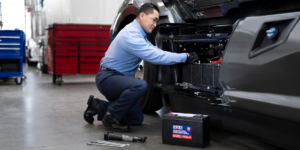WASHINGTON — The American Transportation Research Institute (ATRI) is releasing research that highlights real-world environmental and safety benefits that could accrue from a repeal of the 12% federal excise tax (FET) on new trucks and trucking equipment.
“Truck prices clearly impact annual sales for our dealers, and reduce our customers’ ability to add new equipment to their fleet,” said Jacqueline Gelb, president of the American Truck Dealers. This report greatly reinforces one of the key justifications for repealing the FET on new trucks by quantifying the real-world benefits a repeal will have on the environment and highway safety.
ATRI recently outlined its upcoming research priorities for 2025.
WW1 Tax Still in Place
A World War 1 era tax, the Truck FET has long been an issue for buyers of new trucks. The tax currently adds an additional $20,000 to more than $50,000 to the cost of each new truck purchased, thus acting as a strong deterrent to new truck and trailer sales.
“This new research first estimates the age and annual mileage of the entire Class 8 truck population in the U.S., offering unique insight into the influence of older trucks on industry-wide environmental and safety metrics,” ATRI said. “The research then illustrates how removing the 12 percent Truck FET can accelerate the replacement of older trucks.”
Environmental Impacts
From an environmental perspective ATRI found that, as a Truck FET repeal increases demand for new vehicles, industry CO2 emissions will decrease at an accelerated rate. Each year as the industry adds newer, cleaner diesel vehicles to the fleet, emissions will be reduced annually by 1.2 million metric tons of CO2 over current truck purchases with the Truck FET in place. This equated to cumulative savings of nearly 66 million metric tons of CO2 over a 10-year period.
Safety Measurements
Safety was also shown to benefit from a Truck FET repeal. The accelerated replacement of older trucks reduces the cost of safety technologies, thus adding more Advanced Driver-Assistance Systems (ADAS) equipment to the industry, preventing nearly 750 crashes per year and saving nearly $13.5 billion in crash costs over 10 years.
“The report outlines key reasons why the Truck FET does not function well as a funding mechanism for the Highway Trust Fund, documenting the revenue volatility due to annual fluctuations in new truck sales, as well as the limited number of highway users that pay the tax in any given year,” ATRI said. “The research then calculates how the FET revenue can be replaced.”
A copy of the full report is available here.










